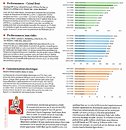- Joined
- Oct 9, 2007
- Messages
- 47,233 (7.55/day)
- Location
- Hyderabad, India
| System Name | RBMK-1000 |
|---|---|
| Processor | AMD Ryzen 7 5700G |
| Motherboard | ASUS ROG Strix B450-E Gaming |
| Cooling | DeepCool Gammax L240 V2 |
| Memory | 2x 8GB G.Skill Sniper X |
| Video Card(s) | Palit GeForce RTX 2080 SUPER GameRock |
| Storage | Western Digital Black NVMe 512GB |
| Display(s) | BenQ 1440p 60 Hz 27-inch |
| Case | Corsair Carbide 100R |
| Audio Device(s) | ASUS SupremeFX S1220A |
| Power Supply | Cooler Master MWE Gold 650W |
| Mouse | ASUS ROG Strix Impact |
| Keyboard | Gamdias Hermes E2 |
| Software | Windows 11 Pro |
French tech print magazine "Canard PC" is ready with early benchmarks of an AMD Ryzen 8-core processor. The scan of a page from its Ryzen performance review article got leaked to the web, revealing three key performance takeaways. In the first selection of tests, Canard PC put Ryzen through synthetic CPU-intensive tests that take advantage of as many CPU cores/threads as you can throw at them. These include the likes of H.264 and H.265 video encoding, WPrime, Blender, 3DSMax 2015, and Corona. Ryzen was found to be faster than the quad-core Core i7-6700K, and the six-core i7-6800K, but somewhere between the i7-6800K and the eight-core i7-6900K.
The next selection of tests focused on PC gaming, with a list of contemporary AAA titles, including "Far Cry 4," "Battlefield 4," "The Witcher 3: Wild Hunt," "Anno 2070," "GRID: Autosport," and "ARMA III." Here, the Ryzen sample was found to be underwhelming - it was slower than the Core i5-6600 quad-core chip clocked at 3.30-3.90 GHz; but faster than the i5-6500, clocked at 3.20-3.60 GHz. The fastest chip in the table is the i7-6700K (4.00-4.20 GHz). The reviewer still notes that Ryzen has a decent IPC gain unseen from the AMD stable in a while.

In the final segment, the reviewers tested the power-consumption of the processor. AMD rates the TDP of the Ryzen 8-core chip at 95W, which was desperately needed from a chip built on the 14 nm node. Here it was noted that Ryzen made a tremendous performance/Watt leap over the 32 nm FX-8370 "Vishera." It consumes 93W, just under the 96W consumed by the Core i7-6900K eight-core chip, and slightly more than the 85W consumed by the 22 nm Core i7-4790K "Devil's Canyon" quad-core chip. The 14 nm i7-6800K six-core chip draws 83W, and the quad-core 14 nm i7-6700K draws 62W.
In all, the reviewer concludes that Ryzen could give the DIY performance CPU market the stir it badly needed, and could give Intel a shake-down, but it boils down the pricing.
View at TechPowerUp Main Site
The next selection of tests focused on PC gaming, with a list of contemporary AAA titles, including "Far Cry 4," "Battlefield 4," "The Witcher 3: Wild Hunt," "Anno 2070," "GRID: Autosport," and "ARMA III." Here, the Ryzen sample was found to be underwhelming - it was slower than the Core i5-6600 quad-core chip clocked at 3.30-3.90 GHz; but faster than the i5-6500, clocked at 3.20-3.60 GHz. The fastest chip in the table is the i7-6700K (4.00-4.20 GHz). The reviewer still notes that Ryzen has a decent IPC gain unseen from the AMD stable in a while.

In the final segment, the reviewers tested the power-consumption of the processor. AMD rates the TDP of the Ryzen 8-core chip at 95W, which was desperately needed from a chip built on the 14 nm node. Here it was noted that Ryzen made a tremendous performance/Watt leap over the 32 nm FX-8370 "Vishera." It consumes 93W, just under the 96W consumed by the Core i7-6900K eight-core chip, and slightly more than the 85W consumed by the 22 nm Core i7-4790K "Devil's Canyon" quad-core chip. The 14 nm i7-6800K six-core chip draws 83W, and the quad-core 14 nm i7-6700K draws 62W.
In all, the reviewer concludes that Ryzen could give the DIY performance CPU market the stir it badly needed, and could give Intel a shake-down, but it boils down the pricing.
View at TechPowerUp Main Site







